|
This is my dynamic, frequently updated homepage. This is a NewsLog, also known as a WebLog or Blog.
Everything is evolving, so don't assume too much.
People to watch:
Adina Levin
Andrius Kulikauskas
Britt Blaser
Catherine Austin Fitts
Chris Corrigan
Clay Shirky
Dan Gillmor
Dave Pollard
David Allen
David Weinberger
Dewayne Mikkelson
Dina Mehta
Doc Searls
Elisabet Sahtouris
Elizabeth Lawley
Euan Semple
Florian Brody
Frank Patrick
Gen Kenai
George Dafermos
George Por
Graham Hancock
Greg Elin
Hazel Henderson
Heiner Benking
Inspector Lohman
Jean Houston
Jerry Michalski
Jim McGee
Jim Moore
John Abbe
John Perry Barlow
John Robb
Joi Ito
Jon Husband
Jon Lebkowsky
Jon Udell
Jonathan Peterson
Judith Meskill
Julian Elvé
Julie Solheim
Kevin Marks
Lawrence Lessig
Leif Smith
Letecia Layson
Lilia Efimova
Lisa Rein
Marc Canter
Mark Oeltjenbruns
Mark Pilgrim
Mark Woods
Martin Dugage
Martin Roell
Mary Forest
Matt Mower
Max Sandor
Michael Fagan
Mike Owens
Mikel Maron
Mitch Kapor
Mitch Ratcliffe
Nathalie dArbeloff
Netron
Noam Chomsky
Paul Hughes
Peter Kaminski
Phil Wolff
Philippe Beaudoin
Ray Ozzie
Raymond Powers
Rebecca Blood
Roger Eaton
Roland Tanglao
Ross Mayfield
Scott Lemon
Sebastian Fiedler
Sebastien Paquet
Skip Lancaster
Spike Hall
Steven Johnson
Stuart Henshall
Thomas Burg
Thomas Madsen-Mygdal
Thomas Nicholls
Timothy Wilken
Todd Suomela
Tom Atlee
Tom Munnecke
Tom Tomorrow
Ton Zijlstra
Lionel Bruel
Loic Le Meur
Nancy White
Mark Frazier
Merlin Silk
Robert Paterson
Colby Stuart
Nova Spivack
Dan Brickley
Ariane Kiss
Vanessa Miemis
Bernd Nurnberger
Sites to watch:
Edge
Junto
Absara
Rhizome
Nanodot
HeadMap
Openworld
FutureHi
Imaginify
Do No Harm
BoingBoing
Smart Mobs
Webcamorama
MetaFilter
NotThisBody
Disinfopedia
YES Magazine
Collective Web
WorldChanging
Disinformation
Escape Velocity
Space Collective
Friendly Favors
Emergent by Design
Independent Media
Global Ideas Bank
Forbidden Science
Greater Democracy
ThoughtsOnThinking
Disclosure Project
Explorers Foundation
Manufacturing Dissent
Collective Intelligence
Action without borders
Free Expression Network
Co-intelligence Institute
Electronic Frontier Foundation
French:
Emmanuelle
Manur
Elanceur
Loeil de Mouche
IokanaaN
Blog d'Or
Le Petit Calepin
GeeBlog
Absara
Guillaume Beuvelot
Ming Chau
Serge Levan
Jean Michel Billaut
C'est pas Mécanique

I live in Toulouse, France where the time now is:
01:06
Unique Readers:

Primarily
Public Domain
Everything I've written here is dedicated to the
Public Domain.

The quotes from other people's writings, and the pictures used might or might not be copyrighted, but are considered fair use. Thus, overall, this weblog could best be described as being:
Primarily Public Domain. |
Syndication:
 ![Validate my RSS feed [Valid RSS]](http://www.newciv.org/pic/valid-rss.png)
|
| Thursday, January 23, 2003 |  |
|
|
|
 "Most everybody is overwhelmed. And they respond with various defense mechanisms. Denial, isolation, increased greed ('I'll get it while I can'), righteousness ('It's their own fault'). There are a whole set of mechanisms that people use to keep from being open, because the quality of the human heart uncontrolled by the mind is that it will give away everything... We have to find ways to exercise the compassion of our hearts, and at the same moment learn how to know what the limits are and be able to say no without guilt." -- Ram Dass Jon Husband mentioned that quote. Indeed, I think it is a well-kept secret that most people are overwhelmed by life at this point. It didn't used to be like that. The world has sped up. Things are accelerating. Most people can't really keep up. Sometimes I think that it is just me, and that the people around me are just standing around waiting for me to get my act together. Until I look a little deeper and realize that most people I know are so thoroughly busy keeping up with their own lives that they don't have much time to stand around and philosophize about what I am not getting done. Nobody seems to have any time left over after doing what they need to do. Because they're not done doing what they need to do.
Fundamentally I think it is a good and useful thing. An evolutionary trigger. See, if there isn't time enough to get everything done, you have to learn to prioritize and to be more discerning about what you do, and what not to do. And it is inevitably leading towards that you'll choose to do the things that you most feel you need to do, the essential stuff - what is most vital. And you'll choose to do what is exciting, rather than what is boring. I mean, if I can't do everything anyway, why on earth would I choose to do the boring stuff, and leave the exciting stuff undone.
But, when we're put under pressure, apparently being asked to do more things than what appears to be humanly possible, it brings up a whole bunch of feelings and reactions from the bottom of our psyche. We might temporarily escape the problem by coercing others into doing more things for us. We might put on blinders, and start ignoring a larger portion of life. We might deny it altogether, and pretend that our life is perfectly in order, all organized, relaxed and secure. We might hold on to the way things used to be.
Ultimately I think it is about learning to both be very open and flexible, and at the same time very discerning and precise. Be open to everything that the universe blows by your nose, but don't assume that you're supposed to analyze and package all of it. That's impossible. Just be open to it. You can watch the leaves blowing off the trees, and find it beautiful, without having to collect or count each single leaf.
There's plenty of time for that which is most essential. The time is always NOW, and there's never more or less of now. So, of course you have time enough for doing what you're doing right now. You just have to give up the idea that you SHOULD be doing something else than what you're doing. Do what you need to do. Don't do everything else.
[ Culture | 2003-01-23 18:12 | | PermaLink ] More >
|
|
|
|
According to New Scientist, American engineers in the Antarctic have begun work on a highway from the giant US coastal base at McMurdo Sound to the South Pole - a distance of 1600 kilometers. An initial purpose for the highway will be to help lay a $250-million fibre-optic cable to the Scott-Amundsen base. The Scott-Amundsen base is home to a growing amount of scientific equipment. But it is out of sight of most geostationary communications satellites, so it cannot reliably send back real-time data to the laboratories in the US that use the equipment. The cable would solve that problem.
[ Technology | 2003-01-23 23:45 | | PermaLink ] More >
|
|
|
|
New Scientist says that the port of Rotterdam is working on a system for docking ships using magnets. Apparently it would save a good deal of time, effort and money if one can just flick a switch to pull a ship into a secure position, rather than maneuvering around with ropes.
[ Technology | 2003-01-23 23:45 | 0 comments | PermaLink ]
|
|
|
|
 SpaceDaily has an article about technologies used by participants in the 2003 Paris-Dakar rally. Thermal screens under the car, cooling system in your helmet, self-cooling containers, and space-food to eat. SpaceDaily has an article about technologies used by participants in the 2003 Paris-Dakar rally. Thermal screens under the car, cooling system in your helmet, self-cooling containers, and space-food to eat.
[ Technology | 2003-01-23 23:45 | | PermaLink ] More >
|
|
| Wednesday, January 22, 2003 |  |
|
|
|
 So, do I want to categorize things when I store them, or do I just want flexible ways of searching for things later on? I'm talking about the filing system(s) in my life. My e-mail archive, my personal databases of things I need to remember. Until now my vision has been that a sufficiently multi-dimensional system could be devised where I could easily assign a piece of information to a number of different categories while I'm in the process of saving it, even being able to make up new classifications on the fly. And then, later, when I need to find the information again, it is already classified in a number of different useful ways, as many ways as I feel like, and chances are that one of them is what I need. By date, by location, by people involved, by subjects, by reference to other items, etc. So, do I want to categorize things when I store them, or do I just want flexible ways of searching for things later on? I'm talking about the filing system(s) in my life. My e-mail archive, my personal databases of things I need to remember. Until now my vision has been that a sufficiently multi-dimensional system could be devised where I could easily assign a piece of information to a number of different categories while I'm in the process of saving it, even being able to make up new classifications on the fly. And then, later, when I need to find the information again, it is already classified in a number of different useful ways, as many ways as I feel like, and chances are that one of them is what I need. By date, by location, by people involved, by subjects, by reference to other items, etc.
But the first problem is that no matter how easy the user interface is, I will quickly become tired of categorizing things. I'm already getting way too much e-mail, and even the job of going through it and deleting it, or filing it in even one folder is beginning to be too much work for me. So, would I really want to have to select from dozens of different pulldown lists whenever I file an e-mail? Probably not.
The second problem is that I don't know what my main categories of interest will be next year. I change often, and next year I mostly likely will have a list of new ways of categorizing things, which I couldn't think of now. But am I then going to go back and apply those categories to all my old information? No, I won't have time for that.
So, I must admit that what I really want is that when I need something, I will get it, in an organized, complete and sensible fashion. I want to say "Computer, give me a list of all the people I have sent e-mail last year!". And when I get the list, I want to say "Sort them in order of volume of mail", and then "Correlate the top 10% with the list of people who've called me on the phone". I want the freedom to make it up on the spot. And I don't want to have had to predict that query a year earlier. I don't want to have had to select a dozen pulldown menus on a screen whenever I get a phonecall. I just want to, at best, answer my phonecall.
What I need is apparently an AI that records everything that happens to me, and that is smart enough to be able to give me a complete list of relevant, cross-indexed information, whenever I desire it. Please.
[ Knowledge | 2003-01-22 23:59 | | PermaLink ] More >
|
|
|
|
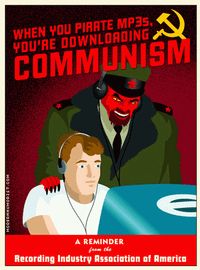 RIAA, the music industry's main organ, has been a lot in the press the past couple of years, because of their ongoing battle with ...just about anybody who wants to enjoy music in new and different ways, without paying them each time. Wired: RIAA, the music industry's main organ, has been a lot in the press the past couple of years, because of their ongoing battle with ...just about anybody who wants to enjoy music in new and different ways, without paying them each time. Wired:"There are a lot more voters downloading music than there are music company executives," Hayes warned. "If the RIAA was my client, I'd advise them to think this one through again." Wise words from an entertainment industry lawyer. But think about it for a moment. We all know, of course, that there are many more voters who would like to share music they like than there are music company executives who want to own all music in the world. And this is a democracy, no? Well, if it were, there wouldn't be any problem at all. If we each had one vote, no problem. But music industry executives can buy power and media coverage that is equivalent to millions of votes and millions of voices. That will probably still eventually put them in the minority, but only barely.
Hillary Rosen, CEO of the RIAA, 'The Most Hated Name in Music' as Wired put it, wants to force ISPs to pay her for the losses she thinks she's incurred from online piracy. Well, obviously she has MUCH more than one vote, since such a scammy scheme even will be taken seriously in the major media. It is taken seriously because she might very well have bought enough politicians to actually carry it through. Luckily she's stepping down at least.
And here's some other good news: British pop star Robbie Williams says that he thinks that music piracy is a great idea.
[ Politics | 2003-01-22 23:59 | | PermaLink ] More >
|
|
|
|
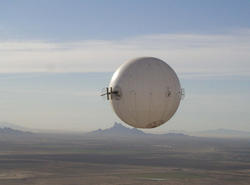 21st Century Airships apparently has a contract to build replacements for cellphone towers for several US companies, in the form of balloons, permanently anchored up in the air. They're still working on developing 'High Altitude Platforms' which would be stationed even higher, in the stratosphere 18-21km above earth, to serve other telecommunications needs, and environmental monitoring. 21st Century Airships apparently has a contract to build replacements for cellphone towers for several US companies, in the form of balloons, permanently anchored up in the air. They're still working on developing 'High Altitude Platforms' which would be stationed even higher, in the stratosphere 18-21km above earth, to serve other telecommunications needs, and environmental monitoring.
[ Technology | 2003-01-22 23:59 | | PermaLink ] More >
|
|
|
|
The MoveOn organization has scored some good successes recently. Mark Smollin posts their announcement. Lately they've focused on a Let the Inspections Work campaign. 310,000 people signed the petition. Several dozen congressmen sent a letter to Bush, asking him also to let the inspectors work. Support for war has dropped sharply.
[ News | 2003-01-22 23:59 | 0 comments | PermaLink ]
|
|
| Tuesday, January 21, 2003 |  |
|
|
|
 Various management gurus, like Tom Peters, are talking about "The Brand called You". The idea is that the world and the job market are moving so quickly that you can no longer count on just getting a job and being safe from then on. Increasingly we are free agents who continuously need to market ourselves and forge new and changing commercial relationships, and to always create our own job. So, to that end, it is critical to be aware of what your brand is, what your selling points are, what your core competencies are, and to have your own rap, so you can quickly convey that to others. Various management gurus, like Tom Peters, are talking about "The Brand called You". The idea is that the world and the job market are moving so quickly that you can no longer count on just getting a job and being safe from then on. Increasingly we are free agents who continuously need to market ourselves and forge new and changing commercial relationships, and to always create our own job. So, to that end, it is critical to be aware of what your brand is, what your selling points are, what your core competencies are, and to have your own rap, so you can quickly convey that to others.
I also get to think about a workshop/program I did, called IBI - Income Builders International - which is a weeklong, very expensive, but rather effective program that in part helps you find what your own personal WOW is, and trains you to present your "thing" in a compelling way in 30 seconds. And all of that is good. I'd really like all of us to be really clear on what our THING is, our WOW, the thing we're here to do, and which we're passionate about. And I think something will click if we are also able to present it clearly and simply, as we then can forge economic relationships more easily.
But now, my own problem is, unfortunately, that at this point I can't really tell you what my own core competency is. I am quite capable in several, rather diverse areas, but I can't tell you in 30 seconds what I do, without making you confused. The kind of stuff I usually would feel like putting on my business card would tend to make people look puzzled and ask "How on earth would you make money on that?". My current business card says "Linking the people who change the world". Sounds good, and I get a certain amount of admiration for that, but nobody's gonna hire me to actually do that.
I'm a computer programmer, a skilled and experienced one. But that is not really what I want to be to the world. I'm getting too old for that, and I don't want to spend all day thinking about logical problems.
I'm a personal counselor and the author of two manuals/books about counseling techniques, and I've seen a lot of success in that area. Yet I only see a couple of clients per week at this point, and it is not my main focus of attention.
I used to be somebody people would come to to have things explained, to make complicated things simple. A philosopher who had the answer to just about anything, including the big questions of life. Nobody comes and asks me anything any longer, so I don't think that's it.
I seem to have a certain knack for gathering people together, and inspiring people. But most of the time I don't know what to do with them once I've gathered or inspired them, and I'm not great at leading and delegating focused work.
I'm obviously a writer, as one of the things that flows most easily would be to write something like this weblog here. I can probably do that in my sleep, even if the world is falling down around me. But I'm no good at writing other people's stuff. I can't write ordered articles on a schedule.
There are more roles I have - networker, event organizer, actor, creative person, evolutionary agent, healer, solver of problems, diplomat, futurist, designer of new systems for people to organize in - but this could easily get long. And it doesn't really add up. I don't mind being multi-dimensional, but I'd still like to be able to be clear on what I am, and where my services are needed, and how I can present myself.
So, please, if any of you happen to know, tell me what my brand is.
[ Diary | 2003-01-21 18:33 | | PermaLink ] More >
|
|
|
|
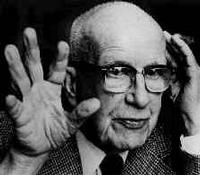 "I live on Earth at present,
and I don't know what I am.
I know that I am not a category.
I am not a thing -- a noun.
I seem to be a verb,
an evolutionary process --
an integral function of the universe."
-- R. Buckminster Fuller
[ Inspiration | 2003-01-21 23:59 | | PermaLink ] More >
|
|
|
|
Agence France-Presse has a new news service in English called the "Global Ethics Monitor" which carries Corporate Responsibility News every day. I.e. mostly news about large corporations doing bad things and being caught in the act. Now, THAT's good news. I don't think you are going to see such a thing from any major U.S. news agency anytime in the near future.
[ News | 2003-01-21 23:59 | | PermaLink ] More >
|
|
| Monday, January 20, 2003 |  |
|
|
|
 Charles Miller: Charles Miller:"I no longer want to know where my files are stored. I no longer care. I have hordes of directories on my various computers called stuff, downloads and documents, and the effort that it would take to organise them into a proper heirarchy is just not worth it. The heirarchical filesystem is a really wonderful thing for programmers and websites, but it just doesn't cut it for personal use. I no longer care where my files are stored." Leslie Michael Orchard:"I'll be burned at the next stake over from Charles when the time comes, for this filesystem heresy. Just the other night, a co-worker was asking me about how diligent I was in organizing my email. I told her, "Not at all. I leave it all in one pile and then run the Find command on it later." She was shocked that I, alpha geek and info freako, didn't have some intricate taxonomy of folders into which mail was sorted by carefully crafted filters.
Here's what I want to see: Storage without explicit organization, but with super-rich metadata for super-fast searches. Allow me to create views made from persistent searches - my "project folder" is simply a collection of resources tied together by a common tag, one of many. And, if I want to form a project hierarchy, make my persistent searches into file objects too. The main thing in all this, though, is that it be woven very deeply within the OS. I don't want a helper app. I want this to replace the standard metaphor completely." Yep, I think that's what I want too. The thing is that the world we live in is no longer hierarchical. Any piece of information fits into a bunch of different structures in different ways, depending on what I'm trying to do. If I go and drop the item in a file in a folder in a filing cabinet, in the place that seems logical at the time, chances are I won't find it next time I'm looking for it. So, yes, maybe there is no good way of easily storing it multi-dimensionally. Maybe the best is to store some concise information about the information (which is called metadata), such as date, person, relations to projects, interests, etc. and then leave it up to an efficient search engine to find things by those keys later on.
[ Knowledge | 2003-01-20 15:43 | | PermaLink ] More >
|
|
|
|
 I wrote these two books on "Transformational Processing", which is the counseling system I use when working with clients. Being a personal counselor is one of the several hats I'm wearing. Now, I'm getting quite a few inquiries about this, in part because the books are freely downloadable on the net. Particularly I often get inquiries and success stories from former east bloc countries, like here today, from Bulgaria: I wrote these two books on "Transformational Processing", which is the counseling system I use when working with clients. Being a personal counselor is one of the several hats I'm wearing. Now, I'm getting quite a few inquiries about this, in part because the books are freely downloadable on the net. Particularly I often get inquiries and success stories from former east bloc countries, like here today, from Bulgaria:"Hello, m-r Funch!
I founded your books "Dialogues" and "Paths" in the internet in Russian language and I am very enthusiastic about the transformational processing.
Since 15 years I have read and made technics from Kastaneda, Osho, east religion, meditations etc. But I went on my road slow and blind.
For a few months with the help of the processing I made a great jump in my self improvement. I found many prickles in my self and took them out. I feel that I am making a progress for 10 lifes forward.
Thank you very much!
And I want to ask you-how can I work with the processing in my country? I already work with a few friends and we see a real progress in everybody.
But here there is no traditions, no even a psychotherapy has a tradition. But I think that all bulgarian people have a need for processing. The people say that we have many extrasenses, witches etc because we are very sensitive nation. But I think that we have such kind of people, because we don't have psychoterapists. And facilitators.
Can you give me some advice?
Excuse me for my English, please!
Nataly" I think there's maybe a basis for me traveling around and doing workshops in those areas. I haven't really decided to go for it yet, but that could be a new adventure.
[ Diary | 2003-01-20 16:00 | 0 comments | PermaLink ]
|
|
|
|
 HeadMap is a site, a magazine and a collective focusing on examining the social implications and applications of location aware devices. Cool, cool things. You know, along the lines of wearable computers that know where you are, and that know things about the local environment, and that can connect you with others who are around. HeadMap is a site, a magazine and a collective focusing on examining the social implications and applications of location aware devices. Cool, cool things. You know, along the lines of wearable computers that know where you are, and that know things about the local environment, and that can connect you with others who are around.there are notes in boxes that are empty
every room has an accessible history
every place has emotional attachments you can open and save
you can search for sadness in new york
people within a mile of each other who have never met stop what they are doing and organise spontaneously to help with some task or other.
in a strange town you knock on the door of someone you don’t know and they give you sandwiches.
paths compete to offer themselves to you
life flows into inanimate objects
the trees hum advertising jingles
everything in the world, animate and inanimate, abstract and concrete, has thoughts attached
[ Technology | 2003-01-20 19:10 | | PermaLink ] More >
|
|
|
|
 I have a strong agreement with Buckminster Fuller who said things like: I have a strong agreement with Buckminster Fuller who said things like:"The things to do are the things that need doing - that YOU see need to be done,
and that noone else seems to see need to be done." You know, I have the belief that every one of us is here to do something unique. It is not necessarily pre-destined or pre-determined what exactly it is. Probably rather something to discover or invent. But if we don't do something unique, if we don't add our unique perspective and sensibilities to the global soup of life, our life is somewhat wasted and meaningless. It doesn't have to be huge earth shattering things. It might be just a slightly different angle on things, which we impart to the people around us. Something we're present for, which nobody else paid any attention to. But there is for sure something that you can dream, something you can see, and something you can do, which nobody else has quite the same opportunity for. Bucky also says:"I look for what needs to be done.... After all, that’s how the universe designs itself." Life might seem meaningless unless you realize that you have an important role in co-designing the continued evolution of the universe. There are lots of things to do, so it would be silly to have a meaningless life.
[ Inspiration | 2003-01-20 19:45 | | PermaLink ] More >
|
|
| Sunday, January 19, 2003 |  |
|
|
|
Lawrence Lessig has a new proposal which possibly might be more likely to fly:"Here is something you can do right now. In this NYT op-ed, I describe a proposal that would move more work into the public domain than a total victory in the Supreme Court would have. The basic idea is this: 50 years after a work has been 'published', a copyright owner would be required to pay a copyright tax. That tax should be extremely low--this proposal says $50, but it could be $1. If the copyright holder does not pay the tax for 3 years, then the work is forfeit to the public domain. If the copyright holder does pay the tax, then its contacting agent would be made a matter of public record. Very quickly we would have a cheap, searchable record, of what work is controlled and what work is free." I think the point is that the compromise would allow corporations to hold on to the 'properties' they truly are doing something with, while the rest, maybe 98% would end up in the public domain, to the pleasure of the general public. Only problem I see is that if the 'tax' is too minimal, the big media companies would most likely choose to pay it on everything, just to hold on to it. There is also a FAQ .
[ Politics | 2003-01-19 23:59 | | PermaLink ] More >
|
|
|
|
Engineers at BASF present some promising new uses of nanotechnology that appear to be just around the corner. Toothpaste that actually rebuilds the enamel on your teeth, shoes that dirt just can't stick to, and batteries as sponges for hydrogen.
[ Technology | 2003-01-19 23:59 | 0 comments | PermaLink ]
|
|
| Saturday, January 18, 2003 |  |
|
|
|
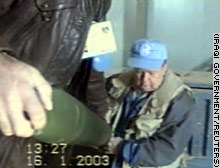 The mainstream U.S. news has been reporting that inspectors have found undeclared chemical warheads in Iraq, and it has been made to sound like "Aha, they lied, they had chemical warheads hidden, hoping we wouldn't find them". What they found were some old boxes, from the 1980s, covered with birdshit, that had never been opened, and which contained empty artillery shells. That is first of all within what is allowed for Iraq, and secondly, they were empty. Meaning, they could get filled with chocolate pudding or with explosives or with chemicals, but they weren't. At the bottom is a detailed response to the story, from somebody who knows what they're talking about. The mainstream U.S. news has been reporting that inspectors have found undeclared chemical warheads in Iraq, and it has been made to sound like "Aha, they lied, they had chemical warheads hidden, hoping we wouldn't find them". What they found were some old boxes, from the 1980s, covered with birdshit, that had never been opened, and which contained empty artillery shells. That is first of all within what is allowed for Iraq, and secondly, they were empty. Meaning, they could get filled with chocolate pudding or with explosives or with chemicals, but they weren't. At the bottom is a detailed response to the story, from somebody who knows what they're talking about.
And now the news is that the inspectors have found 3000 pages of information related to making nuclear weapons at the home of a top nuclear scientist, and those hadn't been listed in the official declaration. And they turn out to be old notes about an attempt to use lasers for isotope isolation, which project was abandoned in 1987.
There is a pattern there, which is obviously intended towards finding Iraq in violation of *something*, whether it is really of importance or not. It is a clever and effective pattern to use to do somebody in. The scheme is simply to make complex demands of what the country is supposed to declare, and when and how, and then, the moment they're a little late, or they forgot something somewhere, or they didn't do it exactly right, they can be shown to be in violation. It's a great plan. A country-wide bureaucracy will never be able to make a full and acurate inventory of everything they have anywhere. Particularly not a corrupt dictatorship of a country, who's infrastructure has already been destroyed several times. Are they going to remember all the places they stored some boxes of artillery shells? No. I'm sure, if you asked the U.S. military to do an inventory, they would forget hundreds of thousands of tons of deadly stuff, underground facilities, whole bases, missiles, submarines and who knows what, just because they can't keep track of it.
According to the same principle, you could go and methodically investigate the home of just about anybody in a typical western country, like me or one of my neighbors. And you would, I'd guess in at least 50% of the cases, find material enough to brand people as criminals, perverts, drug addicts, tax evaders, or whatever you happen to be looking for. If you don't really add things up in context, it is very easy to destroy the reputation of even the best of people. And for a screwed up country like Iraq, run by a crazy dictator, they're having a remarkably hard time doing the same thing.
[ Politics | 2003-01-18 18:12 | | PermaLink ] More >
|
|
|
|
 Tens of thousands of people protested yesterday in Washington D.C., San Francisco, and across the world in Europe and Asia. The good news is that this time the U.S. media didn't try to ignore it like the last time, and didn't lie about the numbers of attendees, as far as I can understand. Tens of thousands of people protested yesterday in Washington D.C., San Francisco, and across the world in Europe and Asia. The good news is that this time the U.S. media didn't try to ignore it like the last time, and didn't lie about the numbers of attendees, as far as I can understand.
[ News | 2003-01-18 18:29 | | PermaLink ] More >
|
|
|
|
Some of the laws of the U.S. state of Virginia are causing a bit of trouble for judges in the state, according to this article. See, Virginia law bans sodomy - "crimes against nature" - which includes oral or anal sex. Yeah, this is a crazy country. I think they should go and enforce it in the Pentagon and the CIA, and for any congress people who live in Virginia. Have a blowjob, go to jail. I think they should be the first to demonstrate what a good idea that is.
[ Politics | 2003-01-18 18:47 | | PermaLink ] More >
|
|
|
|

Steet Sensation shows contiguous photos of shops and bars and restaurants on a bunch of the busiest streets in London. Seamless City in San Francisco does it apparently even better, with a 30 mile seamless path of photos. It would be interesting if that kind of thing were easily accessible online, for many different cities, so that you can do a virtual tour of different areas. Would be even better if it were live, of course.
[ Technology | 2003-01-18 21:40 | 0 comments | PermaLink ]
|
|
|
|

They have other people to play the soldier part.
[ Politics | 2003-01-18 23:59 | 0 comments | PermaLink ]
|
|
| Friday, January 17, 2003 |  |
|
|
|
 Below is an article I wrote eight years ago, which sheds some light on how different waves of societal evolution need different kinds of money, and which calls for a more forward looking kind of currency. Below is an article I wrote eight years ago, which sheds some light on how different waves of societal evolution need different kinds of money, and which calls for a more forward looking kind of currency.We probably need a system where anybody who creates or perceives value also creates money, and the money is not a loan to be paid back, but a gift to be passed on.
In such a system new projects would be financed, not by borrowing money, but by gaining the trust of others who will believe in the project and voluntarily give money to it, because they want to see it happen. Or by producing value that people will feel like rewarding, thereby funding further production of value in the same vein.
That is not possible with scarcity money, but only with money that people can freely give without experiencing a personal loss from doing so. Money that gains value from being used on something desirable, and that retains no value from being kept.
[ Organization | 2003-01-17 01:19 | | PermaLink ] More >
|
|
|
|
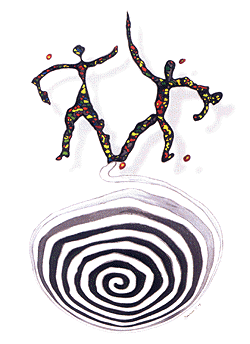 Nobody died, but it is sometimes a good thing to say things while one can. The following was written by Henry Scott Holland on May 15, 1910 and was part of his sermon on death delivered at Westminster while the body of King Edward VII lie in state. And I concur. That would be how I'd prefer looking at death. The fullness of life is eternal, and doesn't really get diminished, just because we die once in a while. Nobody died, but it is sometimes a good thing to say things while one can. The following was written by Henry Scott Holland on May 15, 1910 and was part of his sermon on death delivered at Westminster while the body of King Edward VII lie in state. And I concur. That would be how I'd prefer looking at death. The fullness of life is eternal, and doesn't really get diminished, just because we die once in a while.Death is nothing at all. It does not count. I have only slipped away into the next room. Nothing has happened. Everything remains exactly as it was. I am I, and you are you, and the old life that we lived so fondly together is untouched, unchanged. Whatever we were to each other that we are still. Call me by the old familiar name. Speak of me in the easy way which you always used. Put no difference into your tone. Wear no forced air of solemnity or sorrow. Laugh as we always laughed at the little jokes that we enjoyed together. Play, smile, think of me, pray for me. Let my name be ever the household word that it always was. Let it be spoken without an effort, without the ghost of a shadow upon it. Life means all that it ever meant. It is the same as it ever was. There is absolute and unbroken continuity. What is this death but a negligible accident? Why should I be out of mind because I am out of sight? I am but waiting for you, for an interval, somewhere very near, just round the corner. All is well...
[ Inspiration | 2003-01-17 22:26 | | PermaLink ] More >
|
|
|
|
David Weinberger says some good things about how the structure of the Internet mirrors some qualities we need in a shared world."The Internet was created to move bits around without knowing anything about what the bits encode: porn bits look exactly like biblical bits. So, at its heart the Internet values a non-partisan, unfiltered exchange of information. It is decentralized. It is permission-free. But these are exactly the characteristics required for the pursuit of truth in a diverse world.
The Web, built on top of the Internet, brought us pages, browsers and links. Of these, links are the most important because without them you only have a set of disconnected pages, not a Web. The Web thus begins with connections, not individuals. This mirrors the human context in which morality is possible: we find ourselves first in a world we share. Connections come first. If you start with the individuals instead of our connection, you can never build up to a moral world." Important point there. If we start with the assumption that we're in a world we share, or that we're all connected, or all one, or some variation of that - the answer has to be that the right things to do are those that make things work for the most possible people, including ourselves, and for the planet. But if we start with the assumption that we're all separate, and that others maybe don't even exist, you can without impunity hurt them or exploit them. The words get a bit in the way, but it is a very clear distinction if we get beyond them.
[ Organization | 2003-01-17 23:58 | | PermaLink ] More >
|
|
|
|
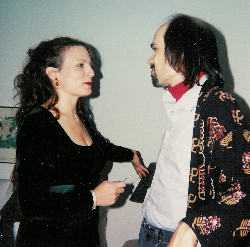 Julie got really mad that, in my consideration of the possibility of moving to France, I had completely overlooked the fact that she for years has talked about her passionate dream of moving to the south of France. So it seemed like I just casually waltzed by and stole the dream from out under her, even leaving her out of it. Well, seems that I needed to work through my own process, in my own way. And it kind of solidified unexpectedly quickly. But of course it would be delightful and magical if we all end up there, possibly this summer. And it turns out that she has done a great deal of research about the different departments around the Midi-Pyrenees area and the housing market and the history, and have built up a bunch of contacts there. And there are of course lots of mysterious, ancient and interesting things to find around there, such as Rennes-le-Château, possibly hiding treasures from King Solomon's temple. I've read Holy Blood, Holy Grail and The Messianic Legacy, weaving an intriguing and compelling story about the Templars, secret orders protecting the bloodline of Jesus, enormous treasures, etc, and a bunch of the clues point to that exact area. Julie got really mad that, in my consideration of the possibility of moving to France, I had completely overlooked the fact that she for years has talked about her passionate dream of moving to the south of France. So it seemed like I just casually waltzed by and stole the dream from out under her, even leaving her out of it. Well, seems that I needed to work through my own process, in my own way. And it kind of solidified unexpectedly quickly. But of course it would be delightful and magical if we all end up there, possibly this summer. And it turns out that she has done a great deal of research about the different departments around the Midi-Pyrenees area and the housing market and the history, and have built up a bunch of contacts there. And there are of course lots of mysterious, ancient and interesting things to find around there, such as Rennes-le-Château, possibly hiding treasures from King Solomon's temple. I've read Holy Blood, Holy Grail and The Messianic Legacy, weaving an intriguing and compelling story about the Templars, secret orders protecting the bloodline of Jesus, enormous treasures, etc, and a bunch of the clues point to that exact area.
[ Diary | 2003-01-17 23:59 | | PermaLink ] More >
|
|
| Thursday, January 16, 2003 |  |
|
|
|
 "First they came for the Jews "First they came for the Jews
and I did not speak out
because I was not a Jew.
Then they came for the Communists
and I did not speak out
because I was not a Communist.
Then they came for the trade unionists
and I did not speak out
because I was not a trade unionist.
Then they came for me
and there was no one left
to speak out for me."
--Pastor Martin Niemöller
[ History | 2003-01-16 13:43 | | PermaLink ] More >
|
|
|
|
 The grapefruit tree in my backyard mysteriously started carrying oranges. Well, sort of. We had this huge grapefruit tree which had a confrontation with the electricity company. A big transformer on a pole was full of mineral oil, and at some point it shorted, and boiling mineral oil was spewed all over my backyard. And DWP, the electricity company, went through a big operation of cordoning it all off and meticulously cleaning it, buying new garden furniture and that kind of thing. But they ended up cutting down the huge grapefruit tree. Which we were really sad about, as it was bountyful with fruit all year. But after it was cut down, very energetic new shoots started coming out from where the trunk used to be. The main one is now a 12 foot tree already, 2 years later, and it has big fruits already. They're the size of grapefruit, but .... they aren't. They're orange, and smell like oranges. And they taste like a weird kind of sour oranges. Like they're a mix of orange and grapefruit. There's an orange tree standing not too far from it, but it has small oranges that look and taste nothing like this. Its a little mystery of nature. Maybe some errant orange seed got grafted into the root of the old grapefruit tree. The grapefruit tree in my backyard mysteriously started carrying oranges. Well, sort of. We had this huge grapefruit tree which had a confrontation with the electricity company. A big transformer on a pole was full of mineral oil, and at some point it shorted, and boiling mineral oil was spewed all over my backyard. And DWP, the electricity company, went through a big operation of cordoning it all off and meticulously cleaning it, buying new garden furniture and that kind of thing. But they ended up cutting down the huge grapefruit tree. Which we were really sad about, as it was bountyful with fruit all year. But after it was cut down, very energetic new shoots started coming out from where the trunk used to be. The main one is now a 12 foot tree already, 2 years later, and it has big fruits already. They're the size of grapefruit, but .... they aren't. They're orange, and smell like oranges. And they taste like a weird kind of sour oranges. Like they're a mix of orange and grapefruit. There's an orange tree standing not too far from it, but it has small oranges that look and taste nothing like this. Its a little mystery of nature. Maybe some errant orange seed got grafted into the root of the old grapefruit tree.
[ Diary | 2003-01-16 16:55 | | PermaLink ] More >
|
|
|
|
Some engineers and surgeons in Singapore have developed a robot that can do brain surgery. Well, specifically it would be able to drill through the bone of the skull faster and more precisely than humans are able to. It runs on the Linux platform, which is no surprise. But now, I think that anybody who works for Microsoft should be forced to have their brain surgery done by a program running on Windows. That would be cruel, but very fair. Gives a new meaning to the Blue Screen of Death.
[ Technology | 2003-01-16 18:10 | | PermaLink ] More >
|
|
| Wednesday, January 15, 2003 |  |
|
|
|
Robert Muller, from '5000 Ideas & Dreams For A Better World' - Idea 53, September 1994:"Children and students are graded for their performance and behavior. Why should not governments be graded too for their performance? A yearly performance report should be produced by the UN or by an outside organization similar to Amnesty International.
A Performance International can show for example:- the number of years a country has lived in peace with others,
- violence statistics,
- ratification of international treaties,
- implementation of UN recommendations on a host of subjects (human rights, labor relations, the environment, etc.),
- disarmament, shifting of military expenditures to peaceful, productive and social services,
- demilitarization, etc.
Such a report would lead to a lot of good in the world."
[ Politics | 2003-01-15 23:59 | 0 comments | PermaLink ]
|
|
|
|
 The U.S. Supreme Court today ruled in the Eldred vs. Ashcroft case, rejecting the arguments for curbing Congress' ability to extend copyrights forever. Large media corporations like Disney want to sit on their exclusive ownership forever, even if they don't know what to do with the old stuff. See Wired. Lawrence Lessig had been arguing the case, and has been a champion for slowing down the copyright crazyness, and it seems like he did the best possible job. But billions of dollars can buy many congressmen and judges, so it wasn't like there were a great chance. The U.S. Supreme Court today ruled in the Eldred vs. Ashcroft case, rejecting the arguments for curbing Congress' ability to extend copyrights forever. Large media corporations like Disney want to sit on their exclusive ownership forever, even if they don't know what to do with the old stuff. See Wired. Lawrence Lessig had been arguing the case, and has been a champion for slowing down the copyright crazyness, and it seems like he did the best possible job. But billions of dollars can buy many congressmen and judges, so it wasn't like there were a great chance.
I think the answer will have to be to start writing the big media assembly line companies out of the picture altogether. There's no in-between. Anyway, technology is quickly going towards that the little people can make fine movies in their garage with cheap equipment. So, let's out-compete the BigCo's who want to own all creativity in the world.
[ Politics | 2003-01-15 23:59 | 0 comments | PermaLink ]
|
|
|
|
John le Carre has an excellent article in The Times. It has been said in various ways already, and it is all an embarrassing farce, but it always helps when somebody famous sticks their neck out a bit."The reaction to 9/11 is beyond anything Osama bin Laden could have hoped for in his nastiest dreams. As in McCarthy times, the freedoms that have made America the envy of the world are being systematically eroded. The combination of compliant US media and vested corporate interests is once more ensuring that a debate that should be ringing out in every town square is confined to the loftier columns of the East Coast press.
The imminent war was planned years before bin Laden struck, but it was he who made it possible. Without bin Laden, the Bush junta would still be trying to explain such tricky matters as how it came to be elected in the first place; Enron; its shameless favouring of the already-too-rich; its reckless disregard for the world’s poor, the ecology and a raft of unilaterally abrogated international treaties. They might also have to be telling us why they support Israel in its continuing disregard for UN resolutions. But bin Laden conveniently swept all that under the carpet."
[ Politics | 2003-01-15 23:59 | | PermaLink ] More >
|
|
|
|
Computerworld: On flight LH 418 from Frankfurt to Washington, Lufthansa AG today began a three-month trial of a new onboard wireless broadband service that allows travelers to connect to the Internet some 30,000 feet in the sky... Users will be able to download from the Internet at speeds up to 3M bit/sec. and upload, initially, at speeds up to 128K bit/sec., according to Lufthansa. The upload speeds will later increase to 750K bit/sec.... Cisco Systems Inc. is providing technology for the onboard 802.11b-based network, which offers wireless connectivity throughout all cabins, in addition to wireline connectivity via an Ethernet connector in the passenger seats. That would be nice. Seems like such a waste a time to just sit and doze off in planes. So, now, if we could just make the people in front of me not lean back their seats ...
[ Technology | 2003-01-15 23:59 | 0 comments | PermaLink ]
|
|
| Tuesday, January 14, 2003 |  |
|
|
|
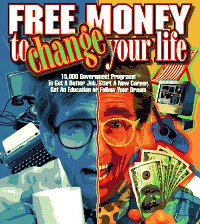 Britt Blaser says some very interesting things about money and capitalism, which I'm trying to wrap my mind around. He says we're watching the death throes of what he calls "Managerial Capitalism", which I agree with. And he also seems to feel that a more grassroots kind of self-organizing, reputation based kind of economy ought to replace it, which I also agree with. And then he says: Britt Blaser says some very interesting things about money and capitalism, which I'm trying to wrap my mind around. He says we're watching the death throes of what he calls "Managerial Capitalism", which I agree with. And he also seems to feel that a more grassroots kind of self-organizing, reputation based kind of economy ought to replace it, which I also agree with. And then he says:"Money is Free. Get Used To It." You know, Managerial Capitalism is based on a shortage of capital. I.e. capital is necessary, but there's never quite enough of it, so those who control it have the upper hand. But nowadays, at least in a place like the U.S., excess credit seems to be thrown at you. You can buy cars with 0% financing, and furniture or washing machines you don't have to start paying before a year or more later. So, capital is going towards being free. And governments that try to stimulate the economy will often, like Bush, do it by giving tax breaks to the rich, in the hope that they'll put the money into enterprises that do stuff. Except for that those enterprises don't really do the right stuff. And, ironically, if capital moves towards being free (freely available), then capitalism is on its way out, because there is no longer a scarcity to control. Hm, I sort of like that, but I'm not sure that's happening. I'd like it to happen. I don't exactly experience an abundance of capital personally, but I can see that it sort of works like that for a fairly large segment of the population. And it certainly seems to be working in the big corporate world. It matters very little what things cost, or how much effort is wasted needlessly, because there is plenty of capital. But what is the bigger reason for the demise of traditional capitalism would be as he says:"Equity markets systematically move money from the less informed to the better informed.
The problem with Managerial Capitalism is not that it's too pervasive and powerful (though it is), but that it is so poor at doing what it claims to do best — allocate people and resources skillfully and compellingly." Capitalistically funded and traditionally managed big companies are terribly inefficient and deliver things many people don't really want, and they're bad at leading people to fulfill their potentials and use their skills really well. So, why are they still the main thing? I'd say, because of the first point, that the people who create them are more well-informed about some important things than you and I. Not well-informed about what we really want, or the best ways of producing that, but well-informed about capital - how to get it, keep it and increase it. And how to keep the general public in the dark concerning your game. They make it look like we all can be co-owners of the capital, owning stocks, investing, having good credit, having a nice credit line, etc. But that is just a distraction, I think. The real thing that would make a difference would be the information about how to organize people and resources efficiently and effectively, without needing investment capital and without needing managers. I.e. the knowledge of how to bring the elements into synergy, without requiring the one guy with all the money to be in charge.
[ Culture | 2003-01-14 17:24 | | PermaLink ] More >
|
|
|
|
 I'm still planning on moving to France. My kids aren't exactly thrilled, except for the smallest one, who's easily excited about the prospect of going just about anywhere. And, based in part on good feedback, I think I'll change my mind and focus mainly on Southern France, as in the South West, Midi-Pyrenees Region. The Cote d'Azur (French Riviera) to the South East also sounds warm and glamorous at first, but crowded and touristy. I don't want to make the same mistake as when moving to California first, we moved to Hollywood, because it sounded like a glamorous thing to write home about. But for people in L.A. Hollywood is mostly just a bad neighborhood, albeit colorful. So, as to South West France, the most vibrant area on various counts would be around Toulouse. It is a big city with lots of high tech computer and aerospace companies. But the bigger area is not very crowded, so you're quickly out in the country. And the whole area has lots of culture and history. Now, it is of course hard to figure it all out in advance, but I think that'll be my starting point when we go and explore a bit. I'm still planning on moving to France. My kids aren't exactly thrilled, except for the smallest one, who's easily excited about the prospect of going just about anywhere. And, based in part on good feedback, I think I'll change my mind and focus mainly on Southern France, as in the South West, Midi-Pyrenees Region. The Cote d'Azur (French Riviera) to the South East also sounds warm and glamorous at first, but crowded and touristy. I don't want to make the same mistake as when moving to California first, we moved to Hollywood, because it sounded like a glamorous thing to write home about. But for people in L.A. Hollywood is mostly just a bad neighborhood, albeit colorful. So, as to South West France, the most vibrant area on various counts would be around Toulouse. It is a big city with lots of high tech computer and aerospace companies. But the bigger area is not very crowded, so you're quickly out in the country. And the whole area has lots of culture and history. Now, it is of course hard to figure it all out in advance, but I think that'll be my starting point when we go and explore a bit.
[ Diary | 2003-01-14 18:09 | | PermaLink ] More >
|
|
<< Newer stories Page: 1 ... 72 73 74 75 76 ... 97 Older stories >> |
|

This is a collage of things that catch my eye, things that need to be said, and stuff I really care about
TRUTH
BEAUTY
FREEDOM
LOVE
TECHNOLOGY
|
| Mon | Tue | Wed | Thu | Fri | Sat | Sun |
|---|
|
|
|
|
|
|
1 |
| 2 |
3 |
4 |
5 |
6 |
7 |
8 |
| 9 |
10 |
11 |
12 |
13 |
14 |
15 |
| 16 |
17 |
18 |
19 |
20 |
21 |
22 |
| 23 |
24 |
25 |
26 |
27 |
28 |
|
|




